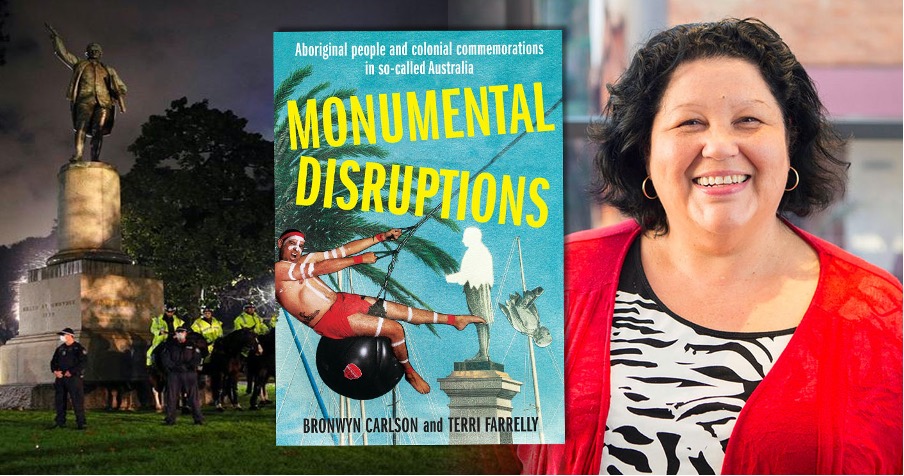In June 2020, sparked by the 250th anniversary of James Cook’s landing at Kamay (Botany Bay), dozens of police were sent to guard a statue of Cook in Hyde Park. Despite the police presence, two women spraypainted ‘sovereignty never ceded’ across the statue.
Scenes like this are being repeated around the world as societies consider whether their public memorials reflect contemporary values. Should these monuments be removed, destroyed or amended?
That is the question central to Monumental Disruptions, a new book co-authored by highly respected academic and Postdoctoral Research Associate Dr Terri Farrelly, Adjunct Fellow, and Professor Bronwyn Carlson, both from the Department of Indigenous Studies.
The book investigates why commemorative statues were erected and their meaning for Aboriginal people in so-called Australia, both then and now. It also compares Australia’s experience with other countries in reassessing its memorials.
We spoke to Professor Carlson about what the book can teach us about the power of truth-telling to achieve reconciliation.
The question of whether to ‘remove, destroy or amend’ historical monuments is one that many communities grapple with. How straightforward is this to answer?
People often look for a simple solution, but the issue of problematic commemorations and monuments is a delicate one that requires thoughtfulness. Problems arise when the options are polarised – remove or keep, and so forth.
Empathy with others helps immensely with these decisions. The book looks at places where communities have done this work together – coming up with solutions as a collective and making changes that everyone can feel part of.
How have people reacted to the book?
The public response has been fantastic. There has been immense interest and we have had people contact us to thank us for sharing this work.
Terri and I wanted to make sure the book is accessible to a broad range of people, not just academics, and to show that there are ways forward. We think everyday folks are pretty keen to live in a world where the truth is known and dealt with, so a better future can be imagined.
You have collaborated with Dr Farrelly for quite a few years now. How did her perspective strengthen this work?
I think it is important that we come together – Indigenous and settlers – to have informed and reasonable conversations about the way forward. Dr Farrelly is not fearful of acknowledging the truth and working towards a more just future – we both believe the truth is beneficial for us all.
Macquarie’s main campus was recently renamed ‘Wallamattagal Campus’ in acknowledgement of the traditional custodians of the University’s lands. What is the impact when our public places are named, or renamed, in this way?
It opens the door for truthful conversations. When we include Indigenous histories, we provide people with an opportunity to reflect on the price Indigenous people have paid and stop misinformation from enduring unabated.
I personally hope Macquarie University goes further in the future and thinks about renaming our institution – the fact that Governor Lachlan Macquarie committed such atrocities against Dharug peoples is hard to ignore. And being connected to the oldest living culture in the world is something to be very proud of and it seems something more worthy to commemorate.
Monumental Disruptions is published by Aboriginal Studies Press.
Read Raymond Evans’ review of Monumental Disruptions in the Sydney Morning Herald.


 Back to homepage
Back to homepage
Comments
We encourage active and constructive debate through our comments section, but please remain respectful. Your first and last name will be published alongside your comment.
Comments will not be pre-moderated but any comments deemed to be offensive, obscene, intimidating, discriminatory or defamatory will be removed and further action may be taken where such conduct breaches University policy or standards. Please keep in mind that This Week is a public site and comments should not contain information that is confidential or commercial in confidence.